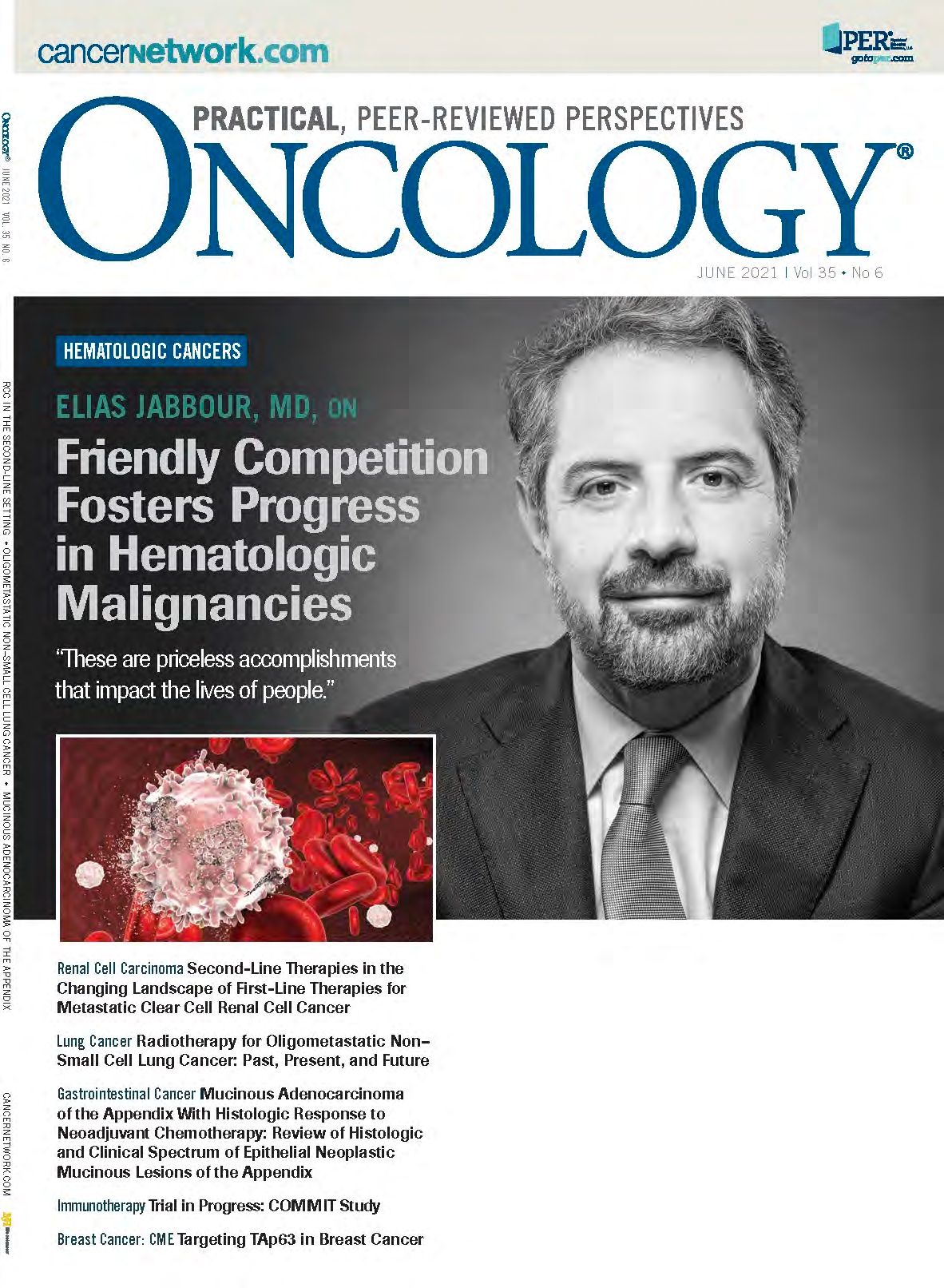Navigating an Optimal Treatment Course for Advanced Kidney Cancer
Benjamin A. Teply, MD, considers the optimal treatment of renal cell carcinoma in a peer perspective accompanying an article by Tiffany Y. Shaw, MD, and colleagues.
Teply is from the Division of Hematology/Oncology in the Department of Internal Medicine at the University of Nebraska Medical Center in Omaha, NE.

The authors of the accompanying article review the rapidly evolving treatment paradigms for renal cell carcinoma in both the first- and second-line settings. A remarkable sea change has occurred over the past 3-plus years, as the results of 5 separate positive phase 3 studies have demonstrated superiority of immunotherapy-containing regimens over monotherapy with the anti-VEGF tyrosine kinase inhibitor (TKI) sunitinib (Sutent) in the first-line setting. As a result, it is now the standard of care that most patients with advanced kidney cancer receive either combination immunotherapy or immunotherapy-TKI combinations. In fact, every eligible patient with advanced kidney cancer should receive immune checkpoint blockade during their treatment course, with the hope of deriving durable responses.
Nonetheless, the first question with regard to treatment sequencing is whether all patients with advanced/metastatic kidney cancer require up-front immunotherapy, rather than second- or later-line immunotherapy. Let us first examine the data for International Metastatic RCC Database Consortium (IMDC) intermediate- and poor-risk disease. In this scenario, my answer is a resounding yes. Four FDA-approved options—axitinib (Inlyta) plus pembrolizumab (Keytruda),1 lenvatinib (Lenvima) plus pembrolizumab,2 cabozantinib (Cabometyx) plus nivolumab (Opdivo),3 and ipilimumab (Yervoy) plus nivolumab4—demonstrated significantly improved overall survival (OS) in these cohorts. These regimens are all included as preferred options with category 1 evidence in the National Comprehensive Cancer Network guidelines. Axitinib plus avelumab (Bavencio)5 is another option, with data showing significantly improved progression-free survival. In sum, the data strongly support first-line utilization of anti–PD-1 therapy for intermediate- or poor-risk disease.
However, is the same true for patients presenting with IMDC favorable-risk disease? The answer is less straightforward. The data for up-front immunotherapy are suggestive of survival benefit, but nearly all these patients will be able to receive a second-line therapy incorporating anti–PD-1 therapy, given the relatively indolent course of favorable-risk disease. Furthermore, with longer-term follow-up, the evidence showing an OS benefit is less clear, and toxicity is greater with combination therapy compared with sequential single-agent therapy. For example, with longer follow-up of the data for axitinib plus pembrolizumab, the early trend toward survival benefit in the first interim analysis (HR, 0.64; 95% CI, 0.25-1.68)1 did not persist in the analysis conducted with a longer follow-up time, a median of 30.6 months (HR, 1.06; 95% CI, 0.60-1.86).6 Similarly, whether early strong signals of benefit with the cabozantinib/nivolumab and lenvatinib/pembrolizumab regimens in those studies’ overall population persist at longer-term follow-up remains to be seen. Thus far, the reported data specifically in the IMDC favorable-risk subgroup for both cabozantinib/nivolumab (HR, 0.84; 95% CI, 0.35-1.97)3 and lenvatinib/pembrolizumab (HR, 1.15; 95% CI, 0.55-2.40)2 remain immature, with few reported deaths and wide confidence intervals. It remains reasonable to treat select patients with favorable-risk disease with TKI monotherapy and to use immunotherapy as second-line therapy.
Patients who require second-line therapy after an initial immunotherapy-containing regimen may be treated with potent TKIs, such as cabozantinib, or with combinations, such as lenvatinib/everolimus (Afinitor). Thus far, the data do not support routine rechallenge with anti–PD-1 therapy after cancer progression on prior anti–PD-1 therapy. Ongoing clinical trials are exploring whether synergy between a TKI and an anti–PD-1 agent will result in resensitization to immunotherapy. However, this approach remains experimental until we have results from studies such as CONTACT-03 (NCT04338269), which is investigating second-line cabozantinib with or without atezolizumab (Tecentriq) after prior immunotherapy.
One of the most striking aspects of both first- and second-line treatment decision-making is that predictive factors or biomarkers, besides IMDC risk stratification, are absent. This lack of predictive biomarkers highlights a major unmet need in the field. In the future, we hope that a combination of factors—for example, PD-L1 status, histologic classification, or molecular profiling—will help guide treatment. Many studies, including correlative aspects of the interventional trials, are pending with this goal in mind.
In conclusion, the field of kidney cancer is evolving so rapidly that optimal therapy sequencing is a steep challenge. Ultimately, using our most effective therapies up-front will result in the most benefit in the highest numbers of patients. However, it will remain a challenge to appropriately sequence therapies to balance added toxicity of combination treatments with potential benefit.
References
1. Rini BI, Plimack ER, Stus V, et al; KEYNOTE-426 Investigators. Pembrolizumab plus axitinib versus sunitinib for advanced renal-cell carcinoma. N Engl J Med. 2019;380(12):1116-1127. doi:10.1056/NEJMoa1816714
2. Motzer R, Alekseev B, Rha S-Y, et al; CLEAR Trial Investigators. Lenvatinib plus pembrolizumab or everolimus for advanced renal cell carcinoma. N Engl J Med. 2021;384(14):1289-1300. doi:10.1056/NEJMoa2035716
3. Choueiri TK, Powles T, Burotto M, et al; CheckMate 9ER Investigators. Nivolumab plus cabozantinib versus sunitinib for advanced renal-cell carcinoma. N Engl J Med. 2021;384(9):829-841. doi:10.1056/NEJMoa2026982
4. Motzer RJ, Tannir NM, McDermott DF, et al; CheckMate 214 Investigators. Nivolumab plus ipilimumab versus sunitinib in advanced renal-cell carcinoma. N Engl J Med. 2018;378(14):1277-1290. doi:10.1056/NEJMoa1712126
5. Motzer RJ, Penkov K, Haanen J, et al. Avelumab plus axitinib versus sunitinib for advanced renal-cell carcinoma. N Engl J Med. 2019;380(12):1103-1115. doi:10.1056/NEJMoa1816047
6. Powles T, Plimack ER, Soulières D, et al. Pembrolizumab plus axitinib versus sunitinib monotherapy as first-line treatment of advanced renal cell carcinoma (KEYNOTE-426): extended follow-up from a randomised, open-label, phase 3 trial. Lancet Oncol. 2020;21(12):1563-1573. doi:10.1016/S1470-2045(20)30436-8

2 Commerce Drive
Cranbury, NJ 08512
All rights reserved.